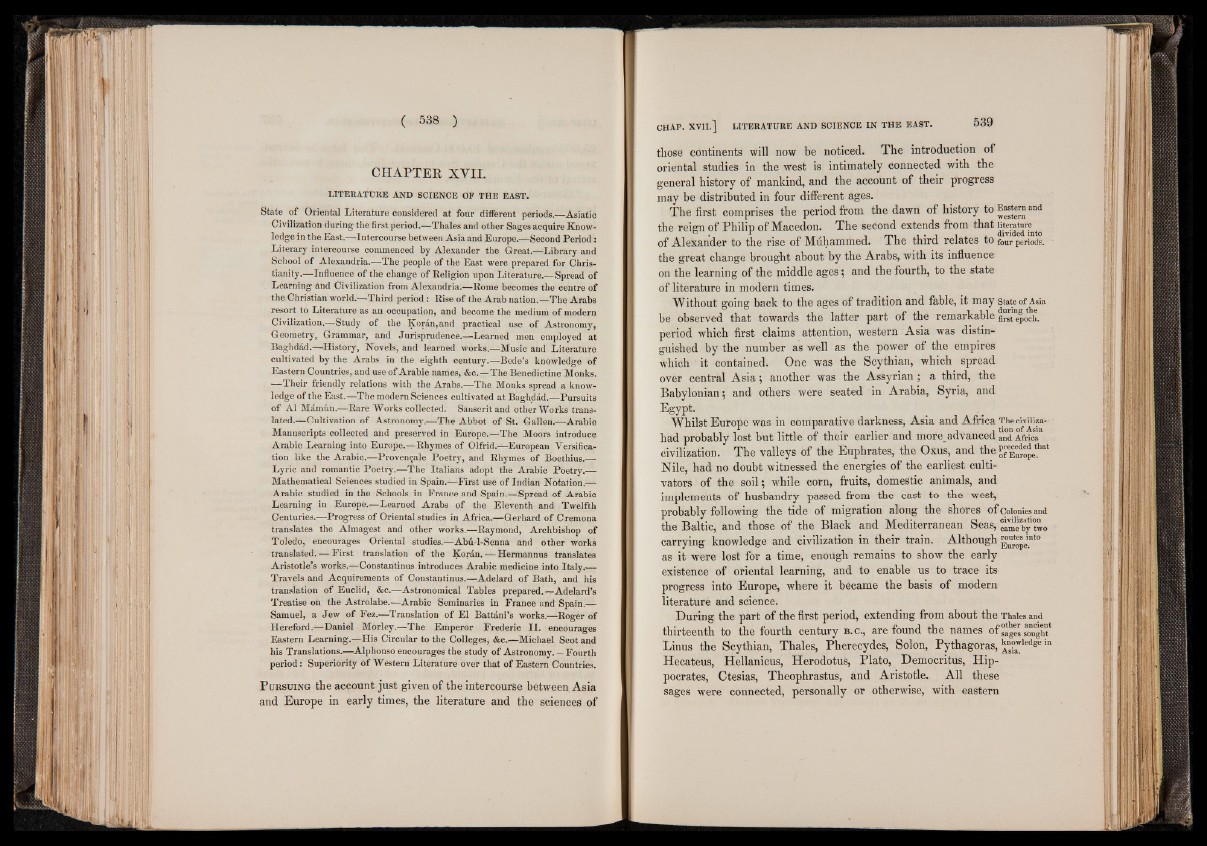
CHAPTEE XVII.
LITERATURE AND SCIENCE OF TH E EAST.
State of Oriental Literature considered at four different periods.—Asiatic
Civilization during the first period.—Thales and other Sages acquire Knowledge
in the East.—Intercourse between Asia and Europe.—Second Period :
Literary intercourse commenced by Alexander the Great.—Library and
School of Alexandria.—The people of the East were prepared for Christianity.—
Influence of the change o f Eeligion upon Literature.—Spread of
Learning and Civilization from A lexandria.—Rome becomes the centre of
the Christian world.—Third period : Rise of the A rab nation.—The Arabs
resort to Literature as an occupation, and become the medium o f modern
Civilization.—Study of the Koran, and practical use of Astronomy,
Geometry, Grammar, and Jurisprudence.—Learned men employed at
Baghdad.—History, Novels, and learned works.—-Music and Literature
cultivated by the Arabs in the eighth century.—Bede’s knowledge of
Eastern Countries, and use of Arabic names, &c.—The Benedictine Monks.
—Their friendly relations with the Arabs.—The Monks spread a knowledge
of the E ast.—The modern Sciences cultivated at Baghdad.—Pursuits
o f A1 Mamun.—Rare Works collected. Sanscrit and other Works translated.—
Cultivation of Astronomy.—The Abbot of St. Gallen.—Arabic
Manuscripts collected and preserved in Europe.—The Moors introduce
Arabic Learning into Europe.—Rhymes of Olfrid.—European Versification
like the Arabic.—Provençale Poetry, and Rhymes of Boethius.—
Lyric and romantic Poetry.—The Italians adopt the Arabic Poetry.—
Mathematical Sciences studied in Spain.—First use of Indian Notation.—
Arabic studied in the Schools in France and Spain.—Spread of Arabic
Learning in Europe.—Learned Arabs of the Eleventh and Twelfth
Centuries.—Progress of Oriental studies in Africa.—Gerhard of Cremona
translates the Almagest and other works.—Raymond, Archbishop of
Toledo, encourages Oriental studies.—Abu-l-Senna and other works
translated. — First translation o f the Koran. — Hermannus translates
Aristotle’s works.—Constantinus introduces Arabic medicine into Italy.—
Travels and Acquirements of Constantinus.—Adelard o f Bath, and his
translation of Euclid, &c.—Astronomical Tables prepared.—Adelard’s
Treatise on the Astrolabe.—Arabic Seminaries in France and Spain.—
Samuel, a Jew o f Fez.—Translation of E l B a ttin i’s works.—Roger of
Hereford.—Daniel Morley.—The Emperor Frederic I I . encourages
Eastern Learning.—His Circular to the Colleges, &c.—Michael Scot and
his Translations.—Alphonso encourages the study of Astronomy. — Fourth
period: Superiority o f Western Literature over that of E astern Countries.
P u r s u in g the account just given of the intercourse between Asia
and Europe in early times, the literature and the sciences of
those continents will now be noticed. The introduction of
oriental studies in the west is intimately connected with the
general history of mankind, and the account of their progress
may be distributed in four different ages.
The first comprises the period from the dawn of history to Eastern and
the reign of Philip of Macedon. The second extends from that literature
• , m i i i i divided into of Alexander to the rise of Muhammed. The third relates to four periods,
the great change brought about by the Arabs, with its influence
on the learning of the middle ages; and the fourth, to the state
of literature in modern times.
Without going back to the ages of tradition and fable, it may state of Asia
be observed that towards the latter part of the remarkable firet ep0Ch.
period which first claims attention, western Asia was distinguished
by the number as well as the power of the empires
which it contained. One was the Scythian, which spread
over central A sia ; another was the Assyrian; a third, the
Babylonian; and others were seated in Arabia, Syria, and
Egypt.
Whilst Europe was in comparative darkness, Asia and Africa ThecivRiza-
had probably lost but little of their earlier and more advanced ¿ d Africa
civilization. The valleys of the Euphrates, the Oxus, and t h e f ^ ^ bat
Nile, had no doubt witnessed the energies of the earliest cultivators
of the soil; while corn, fruits, domestic animals, and
implements of husbandry passed from the east to the west,
probably following the tide of migration along the shores of colonies and
the Baltic, and those of the Black and Mediterranean Seas,
carrying knowledge and civilization in their train. Although
as it were lost for a time, enough remains to show the early
existence of oriental learning, and to enable us to trace its
progress into Europe, where it became the basis of modern
literature and science.
During the part of the first period, extending from about the Thales and
thirteenth to the fourth century B .C ., are found the names of sought1
Linus the Scythian, Thales, Pherecydes, Solon, Pythagoras, bns-,awl<?dgt! in
Hecateus, Hellanicus, Herodotus, Plato, Democritus, Hippocrates,
Ctesias, Theophrastus, and Aristotle. All these
sages were connected, personally or otherwise, with eastern